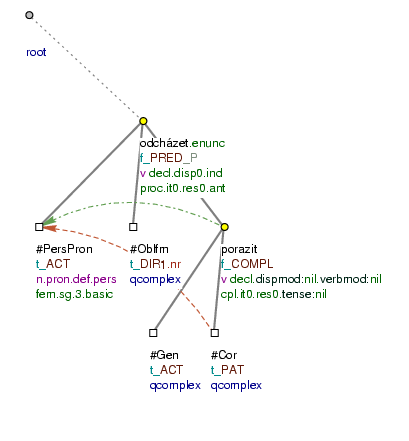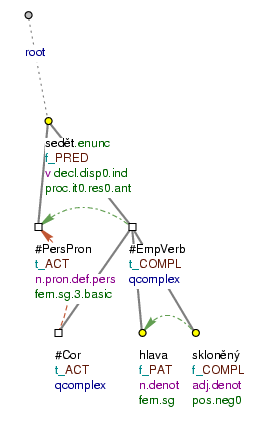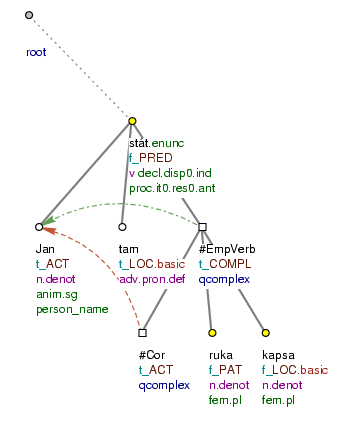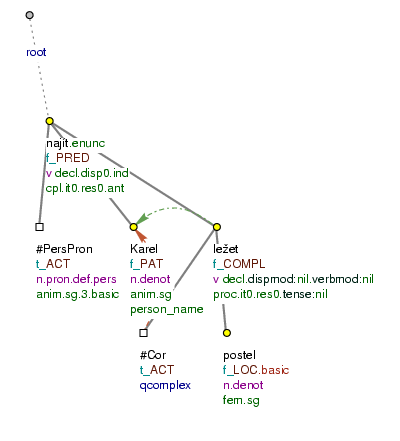There are three types of predicative complements expressed by a non-finite verb form:
-
predicative complement expressed by a participle (see Section 10.2.1, "Predicative complement expressed by a participle"),
-
predicative complement expressed by a transgressive (gerund; see Section 10.2.2, "Predicative complement expressed by a transgressive (gerund)"),
-
predicative complement expressed by an infinitive (see Section 10.2.3, "Predicative complement expressed by an infinitive").
The t-lemma of these predicative complements is always the appropriate infinitive and a valency frame is always assigned.
The relation between a predicative complement and the noun it modifies is expressed also formally (this applies to participles and transgressives), i.e. by agreement in the nominal categories. This governing noun is in a grammatical coreference relation with one of the valency modifications (Actor or Patient) of the predicative complement. (see Section 2.3, "Coreference with verbal modifications that have dual dependency").
Frozen non-agreeing transgressives and participles are not represented as predicative complements but they are represented by means of other functors; for details see Section 5.1.2.1, "Non-agreeing participial constructions" and Section 5.1.3.1, "Frozen transgressive constructions".
A dependent participial construction, if it is not an argument of the governing verb, is represented as a predicative complement (see Section 5.1.2, "Dependent participial constructions").
Examples:
Odcházela poražena.COMPL (=lit. (She) was_leaving defeated.) Fig. 6.177
Akce, podporována.COMPL mnoha sponzory, se velmi zdařila (=lit. (The) event supported (by) many sponsors - very was_successful.)
Agreeing forms of transgressives (the subject of which corefers with the subject of the governing verb) are regularly represented as predicative complements (see also Section 5.1.3, "Transgressive (gerund) constructions").
Examples:
Odešel, zpívaje si.COMPL (=lit. (He) left singing (to)_himself.) Fig. 6.178
Odcházel, byv poražen.COMPL (=lit. (He) was_leaving having_been defeated.)
Constructions of the type "seděl hlavu skloněnou". Expressions of the type "seděl hlavu skloněnou (=lit. (he) was_sitting (his) head bowed)" also belong to the type of predicative complements expressed by a transgressive. These are constructions in which a verb (usually expressing a person's activity) is followed by a transgressival construction with its governing transgressive (a transgressive of the verb mít (=to_have)) elided. In place of the omitted transgressive, a newly established node representing an empty verb is added to the tree: its t-lemma is #EmpVerb and the functor is COMPL.
Examples:
Seděla hlavu {#EmpVerb.COMPL} skloněnou (=lit. (She) was_sitting (her) head bowed.) Fig. 6.179
Jan tam stál {#EmpVerb.COMPL} ruce v kapsách (=lit. Jan there was_standing (with) hands in (the) pockets.) Fig. 6.180
NB! In some cases of direct speech, there is a newly established node for an empty verb (#EmpVerb.COMPL) which also represents a predicative complement in the form of a transgressive: namely a transgressive of the verb říci (=to_say)). For details see Section 3, "Direct speech".
Figure 6.178. Predicative complement expressed by a transgressive
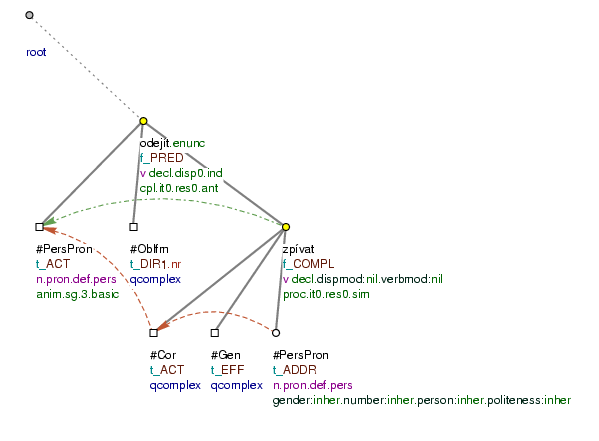
Odešel, zpívaje si. (=lit. (He) left singing (to)_himself.)
Infinitives following verbs of sensory perception (the so-called Slavic accusative + infinitive) are usually represented as arguments, namely the Effect (Viděl Karla přijít.EFF (=lit. (He) saw Karel come.)).
An infinitival predicative complement, i.e. a non-valency modification, is found in cases like the following:
Našel Karla ležet.COMPL na posteli (=lit. (He) found Karel lie on (his) bed.) Fig. 6.181
!!! No infinitive in the position of a predicative complement has occured in PDT. Apparently, there are not many cases in which an infinitive following a verb is considered both non-valency and having a dual dependency (taking part in a grammatical coreference relation, see Section 2.3, "Coreference with verbal modifications that have dual dependency"). It will be necessary to reconsider the issue in the future.
